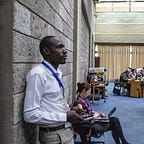New Waste Collection Monitor Goes Tech
Plastic wastes collection is to be monitored digitally with formation of a cloud-based forum to coordinate the activities.
Newly formed, ECORETHINK which joined other environmental NGOs in Kenya said the crowdsourced data platform, Wastebase, was informed by the need to collect data on plastic wastes recycling in Kenya.
Wastebase, developed by UK-based social enterprise, unwaste.io, allows environmental activists to organise, map and visualize data about plastic waste problem in their countries.
ECORETHINK which is joined by the Centre for Environmental Justice and Development (CEJAD) will be involved in coordinating activities by volunteer waste collectors who sort bottles for sale.
They will then scan bottles by barcode with data about each product instantly uploaded to the cloud platform where anyone can filter, view or extract reports about different products, locations or waste-producing companies.
James Wakibia, an environmental activist and a photojournalist said this is a win for environment because the application enables the consumers to get the true picture of companies packaging their beverage and water in plastic and it will help push them be more responsible when it comes to managing the end of life of their products.
“I think our government has registered far too many water companies that use plastic bottles. We need to reduce the number of these companies if they fail to be responsible. It’s ridiculous that we recorded over 180 companies in Nakuru that toss plastics without being responsible. This madness must stop,” he added.
Trained data partners-specialists who translate data into clear and comprehensible information — connect each product to information about brand, ownership and distribution, to show plastics producers and consumers where their waste ends up.
Griffins Ochieng, who is also CEJAD’s Executive Director, said: “We used to work on paper and had groups to share information about plastic waste amongst ourselves. This will be very useful for sharing more widely. In the near future, we’ll be using this in the field at our next brand audits.”
Uwaste.io seeks to use its technology to target countries where traditional solid waste management faces systemic constraints. In many coastal towns and cities in Africa, waste plastic often ends up in local rivers, waterways and mangroves, before making its way to the sea.
Unwaste.io’s Managing Director Mr Cameron Smith, said, “We’re very pleased to be working with NGOs like CEJAD, EORETHINK, among others because data has a huge role to play in encouraging adoption of extended producer responsibility (EPR).”
He also noted that working with trusted partners who know their region produces credible, valuable data to let everyone, including the beverage producers, see where post-consumer plastic bottles really end up.
The training that was organized by CEJAD in collaboration with Wastebase also involved participants from several Kenya-based NGOs and Associations involved in waste such as, Mombasa Waste Pickers Associations, and Kishoka Youth Organisation.
It is estimated that at least 80 per cent of global ocean plastic comes from land-based sources and once it enters the ocean, it is incredibly difficult and costly to recover.
Using Wastebase, CEJAD and their partners can easily collect data from local clean ups, as well as connect each product to information about brand, ownership and distribution. This means they can quickly find out which companies are responsible for discarded waste in their area.
“This application is going to make auditing of brands and manufacturers so much easier,” said Fredrick Otieno from CEJAD.
Crowdsourcing data about waste is not a new phenomenon, however, with the international Break Free from Plastic movement already using information from brand audits across the globe to inform its research and campaigning.
The difference lies in that with Break Free from Plastic, brand audits are usually paper-based and require manual input into a computer, whereas with Wastebase the whole process takes place on a smartphone.
The Wastebase app is available to download for Android users in the UK and Africa and allows environmental activists to organise, map and visualise quantitative information about plastic waste.
The company uses information from brand audits to help local decision makers plan more efficient waste collection routes.
The APP was first tested and put to use in Kenya on September 16 during the World Clean Up Day 2021 and brand audit exercises with the help of volunteers from Nakuru Waste Pickers Association(NWPA) .
ABOUT THE WRITER: An Environmental Journalist and a Plastic Pollution Campaigner, ECORETHINK ORGANIZATION. Twitter Handle: @Benogeh
